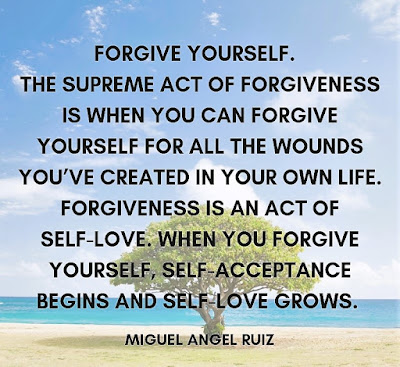Self-Forgiveness: A Journey to Inner Peace
Forgiving oneself can be a challenging journey, but it is a crucial step towards healing and finding inner peace. Whether it is from past mistakes, negative thoughts, or harsh self-criticism, self-forgiveness is the process of letting go of negative feelings and accepting oneself for who they are. Here are some reasons why self-forgiveness is important and tips for getting started on your journey.
.png)
Why is self-forgiveness important?
Reduces stress and anxiety: Holding on to negative feelings and self-blame can cause a lot of stress and anxiety, which can impact our mental and physical health. Forgiving oneself can reduce these negative emotions and help us to feel more relaxed and calm.
Improves self-esteem: When we forgive ourselves, we are able to acknowledge our worth and value as a person, which can increase our self-esteem and confidence.
Increases empathy: By forgiving ourselves, we can become more empathetic towards others who have made mistakes. We are better able to understand that everyone makes mistakes, and this can improve our relationships with others.
Helps us move forward: Holding onto past mistakes can prevent us from moving forward and living our lives to the fullest. Self-forgiveness allows us to let go of these negative feelings and focus on the present and future.
Self-love provides the foundation for self-forgiveness: When we have a strong sense of self-love, it is easier to forgive ourselves for our mistakes and failures. This is because self-love allows us to accept and embrace all parts of ourselves, including our flaws and imperfections.
Self-forgiveness leads to increased self-love: By forgiving ourselves, we are able to let go of negative feelings and self-criticism, which can increase our self-esteem and self-worth. This in turn leads to increased self-love and a deeper sense of inner peace.
Both self-love and self-forgiveness are necessary for inner peace: Inner peace is achieved when we are able to fully accept and love ourselves, including our mistakes and failures. Self-forgiveness allows us to let go of negative feelings and self-criticism, while self-love helps us to embrace all aspects of ourselves. Together, they form the foundation for a healthy, positive self-image and inner peace.
.png)
Forgiving oneself can be a challenging process, but it is an important step towards healing and inner peace. Here are some steps to help you get started on your journey of self-forgiveness:
Acknowledge your feelings: Take time to reflect on your feelings and the negative self-talk that may be preventing you from forgiving yourself.
Practice self-compassion: Speak to yourself in a kind and compassionate way, as you would to a friend. Try to focus on your strengths and positive aspects of yourself.
Let go of self-blame: Recognize that everyone makes mistakes, and try to focus on learning from them instead of dwelling on self-blame.
Write a letter of self-forgiveness: Writing a letter to yourself can be a powerful tool for letting go of negative feelings and forgiving yourself. In the letter, write down what you are forgiving yourself for and why you are deserving of forgiveness.
Seek support: Talking to a trusted friend or professional can provide the support you need to work through your feelings and forgive yourself.
Take action: Forgiving yourself is not just a mental process, it also involves taking action. This may mean making amends, changing habits, or setting goals to move forward in a positive direction.
Practice mindfulness: Practice mindfulness by being present in the moment and focusing on your thoughts, feelings, and sensations. This can help you to let go of negative feelings and focus on self-forgiveness.

.png)

.png)
.png)
.png)

.png)


.png)
No comments:
Post a Comment